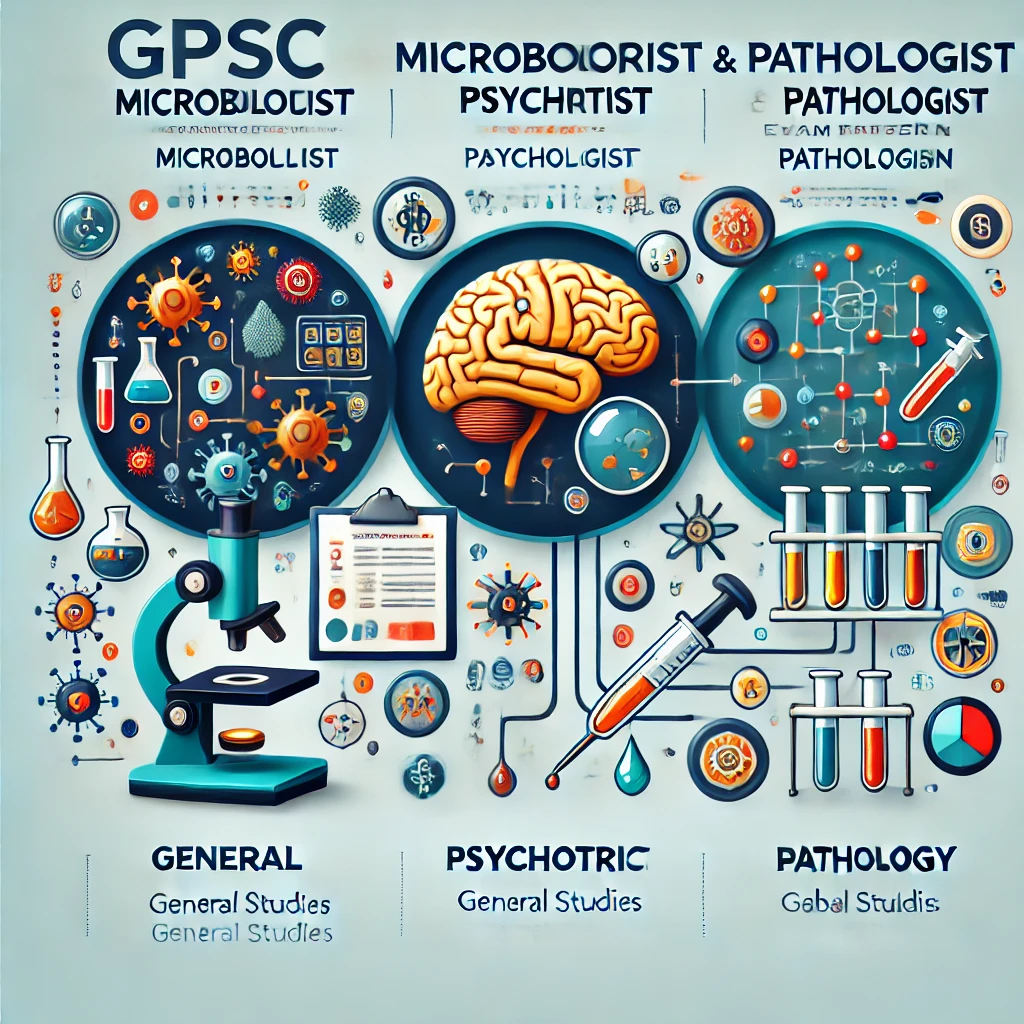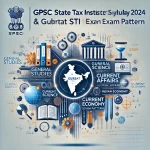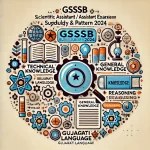Gujarat Public Service Commission (GPSC) will going to conduct competitive exams for the recruitment on various posts Microbiologist, Psychiatrist, and Pathologist in Health and Family Welfare Department, Gujarat State Government. Applicants who will qualify written exam will be called on for Interview in the later selection stage.
Each of these exams tests the candidate’s knowledge in their respective medical field along with general knowledge and aptitude. Understanding the exam pattern and syllabus is crucial for candidates to excel in these exams. This article outlines the exam pattern and syllabus for the GPSC Microbiologist, Psychiatrist, and Pathologist preliminary exams for 2024.
Contents
GPSC Microbiologist, Psychiatrist & Pathologist Prelims Exam Pattern 2024
The GPSC exam for Microbiologist, Psychiatrist, and Pathologist positions generally follows a similar exam structure, divided into two stages: Preliminary Written Examination and Interview.
| Recruitment Conducted By | Gujarat Public Service Commission (GPSC) |
| Name of Exam | HEALTH & FAMILY WELFARE DEPARTMENT RECRUITMENT EXAM |
| No of Vacancies |
|
| Category | Syllabus & Pattern |
| Advt No. | 26/2024-25, 25/2024-25, 24/2024-25 |
| Salary | Pay Scale:- As Per 7th Pay Commission, Level-11, INR 67,700-2,08,700 |
| Expected Exam Date | December 2024 |
| Selection | Preliminary Exam, Prelims Interview & Final Interview |
| Official Website | gpsc.gujarat.gov.in |
Preliminary Written Examination
- Type of Exam: Objective (Multiple Choice Questions)
- Subject: Technical Paper (Qualification Related) (Medium: English)
- Duration: 3 hours
- Total Marks: 200 marks
- Negative Marking: 0.3 Marks for each wrong answer.
Syllabus for GPSC Microbiologist Exam 2024
- GENERAL MICROBIOLOGY:- History of microbiology, Microscopy, Bio-safety including universal containment, personal protective equipment for biological agents, Physical and biological containment, Isolation precautions including standard precautions and transmission based precautions, Sterilisation, disinfection and lyophilisation, Morphology of bacteria and other microorganisms, Nomenclature and classification of microorganisms, Normal flora of human body, Growth and nutrition of bacteria, Bacterial metabolism, Bacterial toxins, Bacteriocins, Microbiology of hospital environment, Microbiology of air, milk and water, Host-parasite relationship, Antimicrobial agents and mechanisms drug resistance, Bacterial genetics and bacteriophages, Molecular genetics relevant for medical microbiology, Quality assurance and quality control in microbiology, Accreditation of laboratories.
- IMMUNOLOGY:- Components of immune system, Innate and acquired immunity, Cells involved in immune response, Antigens, Immunoglobulins, Mucosal immunity, Complement, Antigen and antibody reactions, Hypersensitivity, Cell mediated immunity, Cytokines, Immunodeficiency, Auto-immunity, Immune tolerance, MHC complex, Transplantation immunity, Tumor immunity, Vaccines and immunotherapy, Measurement of immunological parameters, Immunological techniques, Immunopotentiation and immunomodulation.
- SYSTEMATIC BACTERIOLOGY:- Isolation and identification of bacteria, Gram positive cocci of medical importance including Staphylococcus, Micrococcus, Streptococcus, anaerobic cocci etc., Gram negative cocci of medical importance including Neisseria, Branhamella, Moraxella etc., Gram positive bacilli of medical importance including Lactobacillus, Coryneform organisms, Bacillus and aerobic bacilli, Actinomyces, Nocardia, Actinobacillus and other actinomycetales, Erysipelothrix, Listeria, Clostridium and other spore bearing anaerobic bacilli etc., Gram negative bacilli of medical importance including Vibrios, Aeromonas, Plesiomonas, Haemophilus, Bordetella, Brucella, Gardnerella, Pseudomonas and other non-fermenters, Pasteurella, Francisella, Bacteroides, Fusobacterium, Leptotrichia and other anaerobic gram negative bacilli etc., Helicobacter, Campylobacter, Calymmatobacterium, Streptobacillus, Spirillum and miscellaneous bacteria, Enterobacteriaceae , Mycobacteria, Spirochaetes, Chlamydia, Mycoplasmatales; Mycoplasma, Ureaplasma, Acholeplasma and other Mycoplasmas., Rickettsiae, Coxiella, Bartonella etc.
- MYCOLOGY:- General characteristics and classification of fungi, Morphology and reproduction of fungi, Isolation and identification of fungi, Tissue reactions to fungi, Yeasts and yeast like fungi, of medical importance including Candida, Cryptococcus, Malassezia, Trichosporon, Geotrichum, Saccharomyces etc., Mycelial fungi of medical importance including Aspergillus, Zygomycetes, Pseudallescheria, Fusarium, Piedra, other dematiaceous hyphomycetes and other hyalohyphomycetes etc., Dimorphic fungi including Histoplasma, Blastomyces, Coccidioides, Paracoccidioides, Sporothrix, Penicillium marneffei etc., Dermatophytes, Fungi causing Mycetoma, Chromoblatomycosis, Occulomycosis and Otomycosis, Pythium insidiosum, Prototheca, Pneumocystis jirovecii infection, Rhinosporidium seeberi and Lacazia loboi (Loboa loboi), Laboratory contaminant fungi, Mycetism and mycotoxicosis, Antifungal agents and in vitro antifungal susceptibility tests.
- VIROLOGY:- General properties of viruses, Classification of viruses, Morphology: Virus structure, Virus replication, Isolation and identification of viruses, Pathogenesis of viral infections, Genetics of viruses, DNA viruses of medical importance including Pox viruses, Herpes viruses, Adeno viruses, Hepadna virus, Papova and Parvo viruses etc., RNA viruses of medical importance including Enteroviruses, Toga viruses, Flavi viruses, Orthomyxo viruses, Paramyxo viruses, Reo viruses, Rhabdo viruses, Arena viruses, Bunya viruses, Retro viruses, Filo viruses, Human immunodeficiency virus, Arbo viruses, Corona viruses, Calci viruses etc., Slow viruses including prions, Unclassified viruses, Hepatitis viruses, Viriods, prions, Vaccines and anti-viral drugs.
- PARASITOLOGY:- General characters and classification of parasites, Methods of identification of parasites, Protozoan parasites of medical importance including Entamoeba, Free living amoebae, Giardia, Trichomonas, Leishmania, Trypanosoma, Plasmodium, Toxoplasma, Sarcocystis, Cryptosporidium, Microsporidium, Cyclospora Isospora, Babesia, Balantidium, etc., Helminthology of medical importance including those belonging to Cestoda (Diphyllobothrium, Taenia, Echinococcus, Hymenolepis, Dipyllidium, Multiceps etc.), Trematoda (Schistosomes, Fasciola, Fasciolopsis, Gastrodiscoides, Paragonimus,
Clonorchis, Opisthorchis etc.) and Nematoda (etc.). Entomology: common arthropods and other vectors viz. mosquito, sand fly, ticks, mite, cyclops, louse, myasis. Vector control agents, Anti-parasitic agents. - APPLIED MICROBIOLOGY:- Epidemiology of infectious diseases, Antimicrobial prophylaxis and therapy, Hospital acquired infections, Management of biomedical waste, Investigation of an infectious outbreak in hospital and community, Infections of various organs and systems of human body viz. respiratory tract infections, urinary tract infections, central nervous system infections, congenital infections, reproductive tract infections, gastrointestinal infections, hepatitis, pyrexia of unknown origin, infections of eye, ear and nose, septicaemia, endocarditis, hemorrhagic fever etc., Opportunistic infections. Sexually transmitted diseases. Vaccinology: principles, methods of preparation, administration of vaccines types of vaccines, Information technology (Computers) in microbiology, Automation in Microbiology, Molecular techniques in the laboratory diagnosis of infectious diseases, Statistical analysis of microbiological data and research methodology, Animal and human ethics involved in microbiological work., Safety in laboratory and Laboratory management
- CURRENT TRENDS AND RECENT ADVANCEMENTS IN MICROBIOLOGY.
Syllabus for GPSC Pathologist Exam 2024
- Microbiology:- Stool examination, AFB staining of sputum, Bacterial culture
- Clinical Biochemistry:- Renal function tests, Liver function tests, Sugar estimation in blood and urine. Principles and methodology of quality control in laboratory.
- Pathology:- A) General Pathology: Normal cell and tissue structure and function. The changes in cellular structure and function in disease. Causes of disease and its pathogenesis. Reaction of cells, tissues, organ systems and the body as a whole to various sub lethal and lethal injuries.
- Systemic Pathology:- The study of normal structure and function of various organ systems and the aetiopathogenesis, gross and microscopic alterations of structure of these organ systems in disease and functional correlation with clinical features.
- Haematology:- Principles of Haematology, Haematology tests, interpretation and diagnosis of diseases of the blood and bone marrow. Various equipments used in the Haematology laboratory, automation and quality assurance in Haematology.
- Transfusion Medicine (Blood Banking) Knowledge:- Basic immunology, ABO and Rh groups, Clinical significance of other blood groups, Transfusion therapy including the use of whole blood and RBC concentrates, Blood component therapy, Rationale of pre- transfusion testing. Infections transmitted in blood. Adverse reactions to transfusion of blood and components, Quality control in blood bank
- Basic Sciences (in relation to Pathology) a) Immunopathology:- ELISA techniques, Radioimmunoassay, HLA
typing Interpret simple immunological tests used in diagnosis of diseases and in research procedures: Immunoelectrophoresis, Immuno-fluorescence techniques especially on kidney and skinbiopsies, Anti- nuclear antibody (ANA) Anti-neutrophil cytoplasmic antibody (ANCA) - Electron Microscopy:- Principles and techniques of electron microscopy and the working of an electron microscope (including Transmission and Scanning Electron microscope: TEM and SEM
- Enzyme Histochemistry:- Principles, use and interpretation of common enzyme histochemical procedures (Alkaline Phosphatase, Acid Phosphatase, Glucose-6-Phosphate Dehydrogenase, Chloroacetate Esterase).
- Immunohistochemistry:- Principles and exact procedures of various immune histochemical stains using both PAP (Peroxidase- antiperoxidase) and AP-AAP (Alk. Phosphatase-anti-Alk. Phosphatase) ABC (Avidin-Biotin Conjugate) systems; employing monoclonal and polyclonal antibodies. Be aware of the limitations of immuno-histochemistry.
- Molecular Biology:- Molecular biology especially related to the understanding of disease processes and its use in various diagnostic tests. Principle and steps and interpretation of Polymerase Chain Reaction (PCR), Western Blot, Southern Blot, Northern Blot and Hybridisation) procedures.
- Cytogenetics:- Methods of Karyotyping and Fluorescent in-situ Hybridisation (FISH).
- Tissue Culture:- Methods of tissue culture.
- Principles of Medical Statistics: Importance of statistical methods in assessing data from patient material and experimental studies.
- Current Trends and Recent Advancements in Pathology.
Syllabus for GPSC Psychiatrist Exam 2024
- History of psychiatry, Functional and behavioral neuroanatomy, Neuro-physiology and Neuro-chemistry, Neuro- imaging, Neuropsychology (Including Psychological Features of Cerebral Disorders, Clinical Assessment etc.)
- Electrophysiology Including chronobiology, electroencephalogram, etc.
- Psychoneuroendocrinology
- Classification In Psychiatry
- Types of Psychiatry
- Child Psychiatry (Including Learning Disorders, Motor Skills Disorder, Communication Disorders, Pervasive Developmental Disorders (Autistic Disorder, Rett’s Disorder, Childhood Disintegrative Disorder, Asperger’s Disorder), Attention-Deficit/ Hyperactivity Disorder, Conduct Disorder, Oppositional Defiant Disorder, Pica, Tic Disorders, Elimination Disorders, Separation Anxiety Disorder, Selective Mutism, Reactive Attachment Disorder of Infancy or Early Childhood, Stereotypic Movement Disorder, etc.)
- Community psychiatry:- Consultation-Liaison Psychiatry Emergencies In Psychiatry
- Forensic and Legal Psychiatry (Including Indian Lunacy Act, Mental Health Act, Persons with Disability Act, Narcotic Drugs and Psychotropic Substance Act)
- Organic Psychiatry (Including Amnestic Disorders, Catatonic Disorder, Cerebrovascular Disorders, Delirium, Dementia, Endocrine Epilepsy, Head Injury, Headache, HIV – AIDS, Infections, etc.)
- Geriatric Psychiatry
- Theory of personality
- Various Types of disorders Personality disorders, Neurogenetic disorder, Adjustment Disorder, Anxiety Disorders (Including Panic Disorder, Agoraphobia, Phobias, Obsessive-Compulsive Disorder, Posttraumatic Stress Disorder, Acute Stress Disorder, Generalized Anxiety Disorder, etc.) Dissociative Disorders (Including Dissociative Amnesia, Dissociative Fugue, Dissociative Identity Disorder, Depersonalization Disorder, etc.),
- Eating Disorders (Including Anorexia Nervosa, Bulimia Nervosa, etc.), Factitious Disorders, Culture Bound Syndromes, Impulse-Control Disorders (Including Intermittent Explosive Disorder, Kleptomania, Pyromania, Pathological Gambling, Trichotillomania, etc.), Mental Retardation, Mood Disorders (Including Depressive Disorders, Bipolar Disorders, Cyclothymic Disorder, etc.)
- Pre-Menstrual Dysphoric Disorder, Post- Partum Psychiatric Disorders, Movement Disorders (Including Medication-Induced Movement Disorders, etc.), Psychosomatic Disorders, Sexual And Gender Identity Disorders(Including Sexual Desire Disorders, Sexual arousal Disorders, Orgasmic Disorders, Sexual Pain Disorders, Vaginismus, Paraphilias, etc.)
- Sleep Disorders (Including Insomnia, Narcolepsy, Breathing-Related Sleep Disorders, Circadian Rhythm Sleep Disorders, Parasomnias, Nightmare Disorder, Sleep Terror Disorder, Sleepwalking Disorder, etc.) Somatoform Disorders (Including Somatization Disorder, Undifferentiated Somatoform Disorder, Conversion Disorder, Pain Disorder, Hypochondriasis, Body Dysmorphic Disorder, etc.)
- Stress and related disorders, Substance Related Disorders (Including Alcohol-Related Disorders, Amphetamine-Related Disorders, Caffeine-Related Disorders, Cannabis-Related Disorders, Cocaine- Related, Disorders, Hallucinogen-Related, Disorders, Inhalant- Related, Disorders, Nicotine-Related, Disorders, Opioid-Related Disorders, Phencyclidine-Related Disorders, Sedative-, Hypnotic-, or Anxiolytic-Related Disorders, etc.)
- Abuse (Physical / Sexual) or Neglect Of Child /Adult Electro-Convulsive Therapy
- Emotional Intelligence
- Transcultural Psychiatry
- Clinical Psychology and Ethics In Psychiatry
- Learning – Theories
- Memory
- Psychodynamics, Psychotherapy, Sychometry/ Psychodiagnostics, Psychopharmacology, Psychosis (Including Schizophrenia, Schizophreniform Disorder, Schizoaffective Disorder, Delusional Disorder, Brief Psychotic Disorder, Shared Psychotic Disorder, etc.)
- Statistics/Research Methodology
- Stupor
- Suicide management and medico-legal aspect
- Rehabilitation of psychiatric patients
- Miscellaneous: Non-compliance, Malingering, Antisocial Behaviour, Borderline Intellectual Functioning, Age-Related Cognitive Decline, Bereavement [including Death], Academic Problems, Occupational Problems, Identity Problems, Religious or Spiritual Problems, Acculturation Problems, Phase of Life Problems, Chronic Fatigue Syndrome, etc.
- Current Trends and Recent Advancements in the field of Psychiatry.
Important Links
- For Latest GPSC Updates:- https://4syllabus.in/tag/gpsc
- Latest GSSSB Updates:- https://4syllabus.in/tag/gsssb
- For Latest Government Jobs in Gujarat:- https://4syllabus.in/tag/gujarat/
- Official GPSC Website:- https://gpsc.gujarat.gov.in
The GPSC exams for Microbiologist, Psychiatrist, and Pathologist roles require a deep understanding of the respective medical fields. Candidates should plan their preparation by thoroughly reviewing the exam pattern and syllabus while focusing on both theoretical knowledge and practical applications. Best of Luck.
Important FAQS
What topics are included in the Microbiologist syllabus for 2024?
Key topics include:
- Bacteriology
- Virology
- Mycology
- Immunology
- Molecular Microbiology
- Clinical Microbiology
- Environmental Microbiology
What areas should I focus on for the GPSC Psychiatrist exam?
The Pathologist syllabus includes:
- General Pathology
- Systemic Pathology
- Hematology
- Immunopathology
- Microbial Pathology
- Clinical Pathology
- Forensic Pathology
Is there negative marking in this exam?
Yes, 0.3 marks for each wrong answer will be deducted.

![GPSC Assistant Engineer (Mechanical) Syllabus 2024 & Exam Pattern [Narmada Water Supply]](https://4syllabus.in/wp-content/uploads/2024/09/GPSC-Assistant-Engineer-Mechanical-Syllabus-2024-Exam-Pattern-Narmada-Water-Supply-150x150.webp)





